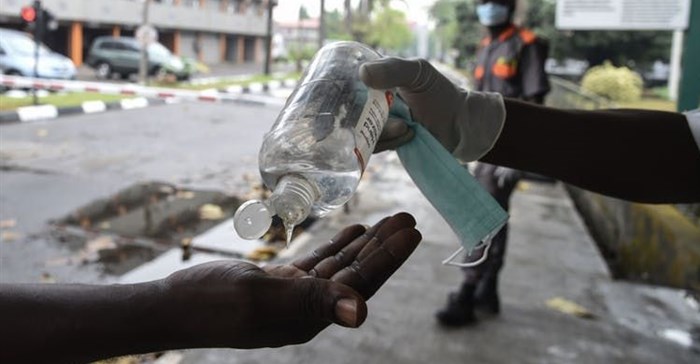
A visitor sanitises hands before entering a state hospital at Yaba, Lagos. Hospitals like this are likely to suffer power cuts as lock down force Nigerians to stay at home and consume more power.Photo by Pius Utomi Ekpei/AFP via Getty Images
In an attempt to contain the virus, the country’s economic capital Lagos has placed a ban on gatherings of more than 20 people. All schools have also been closed. The Federal government has also ordered the closure of all international airports.
The global health crisis coincides with a countrywide electricity crisis. The crisss is underscored by energy demand significantly exceeding supply. A number of factors contribute to this. They include a fragmented gas market. The country generates 80% of its power from gas-fired power stations. Seasonal availability of water supply is another factor. Low levels limit the output of hydro-electric power plants.
Read more:
The biggest threats to Nigeria managing COVID-19: panic, politics and indecision
An unprecedented lockdown would disrupt power system operations due to changes in consumption patterns. Typically, households consume more power in the mornings as people prepare to go to work and later in the day when workers return and use electrical appliances. On average, peak periods for household energy usage are between 05h00-08h00 and 17h00-22h00.
Changes in these periods would result in longer and more frequent outages as energy service providers respond to the pressure of increased demand on an unstable power supply system.
The situation is exacerbated if the lock down extends into the rainy season. Outages could also increase due to inclement weather.
Like any other sector, power supply has a direct impact on healthcare service provision. An effective public health response to a pandemic depends largely on the availability and accessibility to a stable power supply system.
As the World Health Organisation has pointed out:
without electricity, many life-saving interventions simply cannot be undertaken.
Impact on the health sector
Regular power cuts countrywide already present major challenges to the national health system infrastructure. The healthcare system could be further inundated, as the number of Covid-19 cases rise.
Power distribution companies currently manage the allocation of their daily energy quota from the central power grid. This involves energy rationing to a multi-sector that includes the commercial, industrial, education, residential, health and more. Responding to changes in residential consumption patterns could adversely affect the health sector’s energy access duration.
Read more:
Could chloroquine treat coronavirus? 5 questions answered about a promising, problematic and unproven use for an antimalarial drug
Healthcare facilities are particularly vulnerable to limited energy access. A dip in power quality or reduced supply hours would affect the normal day-to-day operation of cooling systems (fridges and air-conditioners), ventilators, oxygen masks and other sensitive medical devices and equipment.
The energy rationing would also result in:
- increased power generator usage that heightens the risk of carbon monoxide poisoning from its emissions. This further weakens the respiratory system which the Covid-19 directly affects;
- crippled telecommunication and ICT services. These would be essential for up-to-the-minute monitoring and reporting;
- a loss of effective lighting at health care facilities.
Nigeria’s health sector could become deluged should there be an exponential rise in confirmed cases of Covid-19 in the coming weeks. The Covid-19 pandemic is likely to disrupt working conditions of the power supply value chain (from generation – utilisation).
The power supply system has maintained a significant level of manual operation over the years. Operations could be impacted if the Covid-19 pandemic grips the country and critical workers in the power sector can’t fulfill their duties either through disruptions in the public transportation service or increased absenteeism.
The response
Industries and power distribution companies currently collaborate in ensuring uninterrupted power supply to industrial facilities.
This capital intensive collaboration involves industries securing longer access to power supply by investing in electricity infrastructure. An example of such infrastructure are mid-voltage power lines. This facilitates delivery of the energy required for industrial processes.
In a lockdown Covid-19 scenario, health care facilities within respective power distribution companies’ service areas would have to be prioritised. This is achieved by significantly reducing the energy allocated to non-critical sectors.
Read more:
Steps Nigeria is taking to prepare for cases of coronavirus
Long term implications
Beyond this pandemic, a dedicated power supply solution like the industries and power distribution companies collaboration should be considered for the health sector.
The energising economies initiative and energising education programme for the commercial, industrial and education sectors (including university teaching hospitals), should be extended to public hospitals nationwide. These power solutions are being implemented across the country. They are run by Nigeria’s Rural Electrification Agency with support from the private sector, the World Bank and African Development Bank.
The deficiency of the energy sector and specifically the power sub-sector already shortchanges the country at all levels. Nigeria needs to explore disparate power supply solutions in accelerating efforts aimed at increasing electrification.
This article is republished from The Conversation under a Creative Commons license. Read the original article.


















